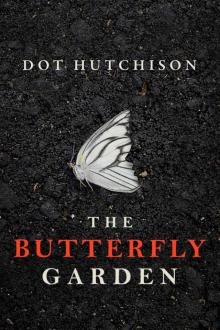- Home
- Dot Hutchison
The Roses of May (The Collector Trilogy Book 2) Page 3
The Roses of May (The Collector Trilogy Book 2) Read online
Page 3
And when the boys come round—and they do come round, because she’s a beautiful girl, and Lord, but the world lights up with her smile—she politely sends them away, because her family is more important.
Because she’s a good girl.
When the service lets out, it’s easy to steal the cute plastic purses a couple of her younger sisters have left on the pew. They forget them all the time, the twins, remembering them only halfway home, and because it’s a long walk to the church to save gas on the weekends, it’s always Zoraida who comes trudging back for them. She shakes her head at it every time, but she smiles, too, because she loves the twins and would do anything for them.
And you know you have to help her.
You have to make sure, for her sake, that she’s always this good, this pure.
So you steal the purses, knowing the twins will forget, and wait for her to come back. The church empties faster than usual, everyone heading home to egg hunts or dinner or extended family. You sit in the shadows and wait, and there she comes, fanning herself with her hat. It’s starched white lace, stiff and inflexible, with peach-colored ribbons woven through the brim and base of the crown. The peach and white look so soft against her dark skin. A single purple-throated lily is pinned like a corsage to her dress, almost high enough to be her shoulder.
You come up behind her, steps soft on the thin carpet, and cover her mouth with your hand. She draws a sharp breath, starts to scream, but your arm comes up against her throat. She struggles, but you know how long to keep the pressure firm, and she falls unconscious.
Her dress is so white, so clean. So innocent. You can’t bear the thought of ruining it.
So when one of her brothers comes by a bit later, worried when she didn’t return home right away, he finds her laid out before the altar, purple-throated white lilies in a halo about her head, her clothing neatly folded and stacked on a pew, the hat atop the pile and her plain buckle shoes beside. The gash across her throat is a clean line, because she couldn’t struggle while unconscious.
No pain, no fear.
She won’t have the chance to fall like Darla Jean, won’t face that temptation and betrayal.
Zoraida Bourret will always be a good girl.
Eddison’s apartment will never win prizes for decorating. It’s not homey, nor is it particularly cozy. If it has an aesthetic, it would probably be vaguely institutional. It’s tidy—even the dishes in the sink are rinsed and neatly stacked, waiting for him to empty and reload the dishwasher—but it doesn’t contain much that makes it feel personal. The walls are the same eggshell they were painted before he moved in. He did add curtains over the windows, partly because the blinds let in too much light and partly because he really doesn’t want anyone looking in. With the exception of the dinner table, a gaily colored tile-topped monstrosity Priya and her mother rescued from a closing Mexican restaurant and gave him as a joke, the furniture is dark and utilitarian. His movies and books live in the random extra closet near the television.
Generally Eddison prefers it that way. When he comes back from assignments where he’s been in people’s homes, seen all the personal ways people shape the places they live, he’s grateful to have a fairly neutral space where he can center himself again. And perhaps there’s a bit of paranoia to it. He’s not sure he knows anyone in law enforcement without the lingering, nearly-always-unspoken fear that one day someone might go after their loved ones in revenge. If he doesn’t have his loved ones out on display, if he doesn’t leave clues to his vulnerabilities lying around in open sight, even in his own apartment, it makes him feel safer.
He didn’t lose his sister because he joined the FBI—he joined the FBI because he lost his sister—but he can’t bear the thought of endangering his parents, or the various aunts and uncles and cousins he still keeps in contact with.
Today, though, when he’s spent the entire day staring at paperwork that will probably fill the rest of the week, he can’t help but realize that the place he calls home is downright sterile.
Changing out of his suit, he settles down on the couch with a box of takeout. Vic’s wife and mother, saints that they are, have offered many times to teach him how to cook properly, but the best he can manage without mayhem is ramen and blue-box mac and cheese. Contrary to Ramirez’s mockery, it has nothing to do with being male and everything to do with getting bored halfway through preparations.
He’s pretty sure the landlord would not be pleased to paint over smoke stains on his kitchen ceiling again.
His personal photos, anything with him or a loved one or a location connected to him, are packed away in shoe boxes hidden in a crawl space in the bedroom closet. There when he wants to look through them, hard for anyone else to find. A few photos are safe to put up, though, and he looks at them rather than try to find a game on the television.
He doesn’t remember telling Priya why there were no pictures displayed when she and her mother came to pick him up for a barbecue at Vic’s house those months they lived in D.C. He almost remembers mentioning it to her mother, though not any of the reasons. Then again, Deshani Sravasti is a formidable woman with a keen (and somewhat terrifying) ability to read people. She probably noticed the lack of photos even before he said anything about it, and made a fairly accurate guess as to why. So maybe she was the one to mention it to Priya.
Thus began the adventures of Special Agent Ken. He’s not sure where Priya got the Ken doll—he suspects one of Vic’s daughters—but she sewed it a suit and a little navy blue windbreaker with FBI in big yellow letters on the back. Now wherever she and her mother go, Special Agent Ken goes along with them, and gets his own photos with famous or interesting backdrops. The handful Eddison has framed are arrayed in an arc over the television.
His favorite is from Berlin; the doll is bent almost in half, facedown on a table next to a quarter-full glass of beer bigger than Ken would be standing. He can just see the tiny lederhosen peeking out from under the windbreaker. He’s pretty sure Priya is the only person he knows who would be completely comfortable making a doll look drunk for a photo session in a public space. She doesn’t sign or date the backs of the photos, just writes in a location for the more obscure backdrops. Personal in sentiment, impersonal in appearance.
Safe.
His phone rings, buzzing and dancing against the coffee table. He eyes it warily until he remembers that Priya was going to call. “So is your new town full of interesting things?” he asks instead of saying hello.
“Interesting is a good word for it,” she agrees. “The plazas are the weirdest mix of good intentions and resignation.”
“I finally got a chance to read the profile on your mother in December’s Economist,” he says. “It’s an impressive write-up.”
“The interview started out a bit rocky; he kept asking about Chavi and Dad, and Mum was less than pleased.”
Less than pleased for Deshani Sravasti normally means her victim is lucky to escape without pissing himself. Clearly the Economist sent someone made of sterner stuff, given how the rest of the interview turned out.
“It got better once he got less personal,” she continues. “Mum loves talking about putting out fires in the different branches.”
“I’m glad they’re recognizing her for it.” It had been startling to walk into the bookstore and see Deshani on the cover of the magazine, her gaze direct and challenging even in a photo. More pictures accompanied the article, one in her Birmingham office, the other with Priya on their couch.
He wasn’t surprised to see the tiny print that credited Priya as the photographer for the ones she wasn’t in.
There’s a pause then, less a second of silence than a hesitation, and the one thing Priya has never done is hesitate. This is the girl who, within ten minutes of meeting him, threw a teddy bear at his head and told him not to be such a fucking coward. They’ve been friends ever since.
He generally prefers not to examine what that might say about him.
“What i
s it, Priya?”
“Are you guys okay?”
The question makes him cold, for no reason he can name, and he jabs the plastic fork back into the noodles. “What, the team? We’re fine.”
“Are you? Because I got cards from all three of you today.”
Shit.
He had no way of knowing that Vic intended to send a card, but he should have remembered Ramirez. Would it have been less noticeable if only two of them had arrived?
But this is Priya, and she is her mother’s daughter, and neither of them has ever needed all the facts to get correctly from point A to point M.
“You don’t have to tell me what’s going on. I know you might not want to, or might not be able to. I’m just worried.” That hesitation again, that testing the ice before the step. “Mercedes glittered over the butterflies on her card.”
Fuck.
But last Tuesday—the day he’d sent the card—was a bad day for all of them. He shouldn’t be surprised.
“So let me rephrase slightly,” she continues. “Will you all be okay?”
Eddison sits on that a moment, lets it sink down to his bones as if there’s an answer to be found there. Priya doesn’t say anything else, doesn’t push or prod or rush him to a response. She’s gotten good at waiting.
The Butterflies were good at waiting, some better than others. Most of those who are left aren’t good at it anymore.
He wasn’t at the Garden when they pulled out the bodies of the girls who’d died in the moments leading up to the explosion, or in it. He was on his way back to Quantico, rage seeping into the places hollowed out by what he’d seen.
As they learned what had happened to those girls, he’d been filled with the horrifying realization that this case would never go away. Not that it wouldn’t be legally resolved; it would. Eventually. But this wasn’t a case to solve and put away, move on to the next. It wasn’t even one to idly look back on while reflecting on the course of one’s career.
This was a case to ruin you, to utterly wreck you for the rest of your life because how can people do this?
And because this is Priya who’s asking, Priya who knows better than most what it means to not be okay—knows that it’s all right to not be okay—he considers the limits of what he can and cannot tell her and decides it’s going to get out in the news anyway, but she won’t be the one to share it.
“One of the Garden survivors killed herself last week.”
She makes a small sound, thinking rather than responding.
“It wasn’t really a surprise,” he continues. “Not with this one. We were more surprised that she hadn’t done it earlier.”
“Family?”
“She broke while she was still inside there. Her family broke her the rest of the way. But she makes . . .”
She says it so he doesn’t have to. “Three,” she says simply. “That’s three suicides in less than four months.”
“There are two others the psychologists have issued warnings for. ‘More likely than not’ was how they put it.”
“And the others?”
“Time will tell.” He hates that phrase, hates its truthfulness more. “A few of them will be . . . not fine, I guess, but as fine as they can be. Anything tries to destroy them, they’ll burn the world to take it down with them.”
“Four months isn’t much time.”
“Less than four.”
“Less than four,” she agrees peaceably, not because the correction is important but because he’s still raw, and she knows it. He should be less okay with that than he is. He’s an FBI agent, damn it, and if he must be vulnerable he doesn’t need anyone to see it.
“Did you ever think about it?” he asks suddenly.
“No.” The answer is prompt, but not immediate. Not defensive, not reflexive. “Chavi was a very large part of my world, but she wasn’t all of it. However heartbroken I was, and am, I was equally pissed off. That makes a difference, doesn’t it?”
“Does it?”
“Even if it doesn’t, other things do. My sister was taken from me. But I didn’t lose my freedom. I didn’t lose my identity. I didn’t have a set day to die.”
An expiration date, one of the Garden survivors calls it. Like a gallon of milk.
He can feel his shrimp lo mein churn in his stomach.
“I lost my sister. Your Butterflies lost themselves. There’s a difference in that, at least.”
“We knew she was going to do it. We warned her parents, begged them to let her get the help she was offered.”
“Vic begged.”
“And Ramirez,” he says without shame, because begging isn’t a thing he does.
He’s always been better with suspects than with victims. Another thing that probably says more about him than it should.
“Knowing doesn’t change how you feel once it happens.”
But doesn’t it? Then again, that’s not a question she’ll hold too close. The man who murdered her sister is still out there; even if they learn who he is, it won’t bring Chavi back.
“So do I ever get to meet them?” she asks.
He blinks, almost pulls the phone away from his ear to stare at it. “Who?”
“The ones who’ll set the world on fire if they have to burn. They sound like my kind of people.”
It startles a laugh out of him. “Oh, they are, they—no. No, absolutely not, you are never allowed to meet them,” he says sternly, brain catching up to the implications of that statement. Christ, Priya would get along with Inara and Bliss without question. Like a fucking house on fire. No.
Her soft huff of laughter, little more than a breath, eases some of that knot in his chest, and it’s bizarre how he can feel simultaneously better and worse.
But for his own well-being, as well as the state of the world at large, he very much needs them to never meet.
Oh-shit-thirty Wednesday morning, I snap from sleep to panicked flailing as the bed drops out from beneath me. Or seems to. I bounce against the mattress, slapping at my eyes to get rid of the crust. My room is still dark, but there’s enough light from the hallway to silhouette my mother, standing over my legs with her hands on her hips in a Superman pose. The bed frame creaks under her added weight.
I groan and flop back, yanking a pillow over my face. “What the hell, Mum?”
She laughs and drops down next to me. I can smell the coffee on her breath, warm and familiar on my neck, as she wraps an arm around me. “Just because you can stay in pajamas for class doesn’t mean you can avoid getting up at a reasonable hour.”
“Is it still dark outside?”
“Yes.”
“Then it is not a reasonable hour.”
Mum just laughs again and lifts the pillow to plant a kiss on my cheek. “Up, my love. I’ll make you breakfast.”
She does make amazing waffles. They might even be worth getting out of bed for.
Mum leaves for work right after breakfast, and I spend the rest of the morning trying to pummel my brain into thinking in French for math and science and history. So much history—it never occurred to me how US-centric even my world history classes were until I had to start playing catch-up to the kids I’ll be in a classroom with this fall.
When my head starts aching from the language overload, I put everything away and bundle up in eight or ten layers to brave the world outside. It’s a clear day, but cold. Oh my God, so cold.
Part of me wonders why the vets bother with the space heaters rather than going inside. It’s still cold enough to freeze a tit off just outside the pavilion and they’ve got three different Starbucks in spitting distance, after all. But I’m not going to ask. This will be my first time actually playing with them, and I have to earn my place. It’s the same with any group.
“Here, Blue Girl, you’re playing with me today,” announces the red-nosed Vietnam vet before I even get up onto the grass.
Some of the others snicker at the name, but it’s apt enough. The bindi between my eyes is blue crystal
set in silver, same as the stud at my right nostril, and as soon as I pull the knitted cap off, the royal-blue streaks in my hair are bright and clear. The one who named me blinks at the hair, then laughs like he’s acknowledging a point.
“So what do I call you?” I ask, climbing over the bench.
“You call this ugly son of a bitch Corgi, you hear?” howls the man next to him, ignoring the elbow Corgi digs into his ribs. Their hats are identical, and I wonder how it must be to go through hell with someone and have each other to lean on after.
Well, a different kind of hell, anyway. Loss is loss, and my mother and I have each other, but we didn’t come through their kind of war.
Some of the others introduce themselves while Corgi and I place our pieces—Steven and Phillip and Jorge, and next to Corgi, Happy, who may be a little bit drunk. The others are intent on their games. From what I suspect is his customary corner, Gunny gives me a small smile and a wave, then looks back to his game with the bland-faced man I spoke to last time.
As Corgi and I start to play, Happy and Jorge pay more attention to our game than to theirs, both of them coaching me with often conflicting advice. Except for Happy’s initial outburst, they’re on their best behavior, which is to say, they alternate between extreme and sometimes awkward courtesy and the kind of crassness that probably made their sergeants cry with pride back in the day. They stumble over apologies as soon as they remember I’m listening. But I laugh with them, and gradually they relax into something that must be closer to their usual dynamic, or at least as close as it can be with a female intrusion.

 The Butterfly Garden
The Butterfly Garden The Summer Children (The Collector Series Book 3)
The Summer Children (The Collector Series Book 3) A Wounded Name (Fiction - Young Adult)
A Wounded Name (Fiction - Young Adult) The Roses of May
The Roses of May The Roses of May (The Collector Trilogy Book 2)
The Roses of May (The Collector Trilogy Book 2) The Summer Children
The Summer Children